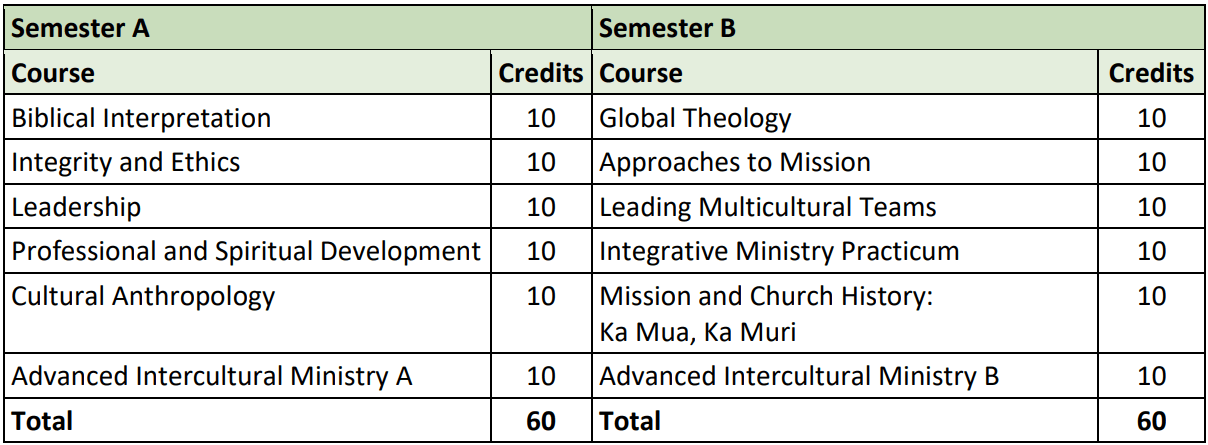Diploma in Intercultural Studies (Level 6)
(Applications for NZ Domestic Students for Semester B 2025 close: 16th May 2025)
(Applications for International Students for Semester B 2025 close: Closed * Please enquire
|
|
Intakes in February and July |
|---|---|
|
|
One year full-time study (two semesters) |
|
|
Level 6 |
|
|
120 Credits |
|
|
For a full list of fees including food and accommodation please see our Fees page |
|
|
If you are a NZ Student you may qualify for Fees Free |
|
|
NZQA Accredited – NZ Diploma in Christian Studies (Intercultural Studies) Level 6 |
Programme Aim
The programme is designed for learners wanting to lead effectively in fields of Christian intercultural ministry and mission. It is also notably suited to those looking to work in global intercultural Christian mission work with international mission agencies and NGOs.
The programme aims to equip learners with advanced theological and biblical foundations, foster and support the ongoing faith journeys of learners, and develop practical leadership and intercultural skills relevant to ministry, mission, and Christian service through a holistic intercultural learning environment and real-world ministry activities.
Entry Requirements
Academic requirements:
• The Eastwest Diploma in Intercultural Studies (Level 5) (2793), or equivalent, or
• Through special admission made by application to the Academic Dean which may be granted based on broad theological, biblical, ministry and life experience.
International students will require an IELTS Academic Score of 6.0 overall with no band less than 5.5 (or equivalent).
Applicants should have:
A Christian testimony of faith in Jesus Christ
A membership of, and at least one year’s involvement in, a local church or assembly
The commendation of the local church
Evidence that they can undertake a course of intensive study and practical activity, i.e.:
The successful completion of a course of secular study or training
Satisfactory performance in regular employment
Be at least 18 years of age in the year of commencement of study
Physical fitness
Willingness for cross-cultural mission service
Credit Recognition and Transfer
Students may apply for programme credit to be recognised based on prior study and/or experience. Credit will only be awarded for complete courses; credit will not be awarded for individual learning outcomes or parts of courses.
Course Details
Biblical Interpretation (10 Credits)
Aim:
This course aims to equip learners with skills for biblical and theological interpretation of Old and New Testament Scripture and will prepare learners to develop biblically-based, application-focused messages for faith communities.
Content:
History of biblical interpretation
Biblical interpretation methods
Analyse and exegesis of Scripture
Expositional message development
Global Theology (10 Credits)
Aim:
This course aims to equip learners with skills to theologically analyse diverse contexts and apply biblical principles in order to propose solutions for theological issues in global cultural contexts.
Content:
Globalisation and Christianity
Western theology
Non-western Christian theology
Christian theology in global contexts
Integrity and Ethics (10 Credits)
Aim:
This course aims to equip learners with the skills to evaluate ethical issues facing contemporary Christian ministry and mission and to review and propose solutions to ethical questions facing those in the church ministry, missional, and workplace contexts.
Content:
Biblical and theological ethics
Contemporary ethical issues
Ethics in an intercultural context
Navigating the ethics landscape
Approaches to Mission (10 Credits)
Aim:
This course aims to equip learners with skills to evaluate and review contemporary approaches to cross-cultural mission and to propose appropriate missional responses to defined missional settings.
Content:
Emerging trends in mission
Business as mission
Community development
Digital mission
Ecological mission
Church planting
Leadership (10 Credits)
Aim:
This course aims to equip learners with skills to analyse and apply leadership skills within a Christian ministry, missional, or workplace setting.
Content:
Leadership strengths and dynamics
Biblical leadership
Leadership in practice
Leadership toolbox
Leading Multicultural Teams (10 Credits)
Aim:
This course aims to equip learners with skills to lead multicultural teams in ministry, missional, and workplace settings, and will help grow awareness in learners of the cultural aspects which impact communication and decision-making in these intercultural settings.
Content:
Leading multicultural teams
Multicultural team dynamics
Communication and decision-making
Intercultural conflict resolution
Professional and Spiritual Development (10 Credits)
Aim:
This course aims to equip learners with the skills needed to critically reflect on their own personal faith journey and to develop plans for personal and professional development in order to refine their own practice in ministry and mission.
Content:
Critical reflection
Spiritual formation, disciplines, and practices
Professional development planning
Integrative Ministry Practicum (10 Credits)
Aim:
This course aims to provide learners with an integrative ministry experience in an intercultural setting to allow learners to exercise practical skills and to critically reflect on their own personal faith and professional development as a means to refining their own practice.
Content:
Integrative ministry practicum experience
Reflective practice
Cultural Anthropology (10 Credits)
Aim:
This course aims to equip learners with ethnographic research skills to allow the evaluation of community and individual cultural perspectives that inform implications for intercultural engagement.
Content:
Cultural anthropology
Ethnographic research methods
Cultural perspectives
Intercultural engagement
Mission and Church History: Ka Mua, Ka Muri (10 Credits)
Aim:
This course aims to equip learners with skills to research and evaluate missional trends and issues throughout mission and church history and to propose historically informed strategies for contemporary intercultural mission.
Content:
Mission and church history
Historical trends
Strategies for mission
Advanced Intercultural Ministry A & B (20 Credits)
Aim:
This course aims to equip learners with skills for intercultural ministry leadership through targeted ministry training, learner leadership in intercultural ministry activities, and reflective practice.
Content:
Intercultural ministry leadership
Cross-cultural communication
Intercultural teams
Mission in practice
Reflective practice
Delivery Schedule
The following is an indicative delivery schedule. As such, changes may occur year-to-year.
